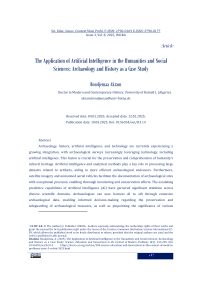The Application of Artificial Intelligence in the Humanities and Social Sciences: Archaeology and History as a Case Study
Автор: Boudjemaa A.
Журнал: Science, Education and Innovations in the Context of Modern Problems @imcra
Статья в выпуске: 3 vol.8, 2025 года.
Бесплатный доступ
Archaeology, history, artificial intelligence, and technology are currently experiencing a growing integration, with archaeological surveys increasingly leveraging technology, including artificial intelligence. This fusion is crucial for the preservation and comprehension of humanity's cultural heritage. Artificial intelligence and analytical methods play a key role in processing large datasets related to artifacts, aiding in more efficient archaeological endeavors. Furthermore, satellite imagery and unmanned aerial vehicles facilitate the documentation of archaeological sites with exceptional precision, enabling thorough monitoring and conservation efforts. The escalating predictive capabilities of Artificial Intelligence (AI) have garnered significant attention across diverse scientific domains. Archaeologists can now harness AI to sift through extensive archaeological data, enabling informed decision-making regarding the preservation and safeguarding of archaeological treasures, as well as pinpointing the significance of various archaeological findings. This technology assists in determining the optimal excavation sites within intricate cultural landscapes.
Humanities, Social Sciences, History, Archaeology, Artificial intelligence, Technology
Короткий адрес: https://sciup.org/16010489
IDR: 16010489 | DOI: 10.56334/sei/8.3.14
Текст научной статьи The Application of Artificial Intelligence in the Humanities and Social Sciences: Archaeology and History as a Case Study
The history of human civilization is extremely ancient, with the history of Earth itself dating back over four and a half billion years. There are still many mysteries surrounding Earth's history and human civilization. It is important for humans to understand history as it provides them with a profound insight into how Earth and humans have evolved over billions of years. This ensures their ability to understand the patterns present and foresee how the future might unfold. However, to accomplish all these tasks, everyone must rely on individuals who unearth various aspects of the history that the Earth has covered over time. These are archaeologists who extract historical facts from the depths of the Earth, excavating sites to study human history and learn details of days gone by.
-
1- The main components of Artificial Intelligence
Recent research at the beginning of 2022 indicates that in the field of archaeology, most Machine Learning (ML) and Deep Learning (DL) algorithms are utilized for classifying and identifying archaeological artefacts. However, the detection of archaeological data using DL is still insufficient.
The main components of Artificial Intelligence commonly used in archaeology include:
Machine learning: Enables software applications to become more accurate in predicting outcomes without explicit programming.
Deep learning: A subset of machine learning that learns from data by using artificial neural networks with representation learning.
Neural network: NN simulates the way the human brain operates through a series of algorithms seeking to recognize underlying relationships in a set of data.
Natural Language Processing (NLP): A subfield of computer science and artificial intelligence that deals with recognizing, interpreting, and generating human language and speech.
Computer vision: A subset of machine learning that identifies patterns enabling computers to interpret the content of images based on graphs, tables, PDF images, and video clips.
Sci. Educ. Innov. Context Mod. Probl. P-ISSN: 2790-0169 E-ISSN: 2790-0177 Issue 3, Vol. 8, 2025, IMCRA
Cognitive computing: Involves technological platforms that attempt to simulate the way the human brain works2.
Artificial
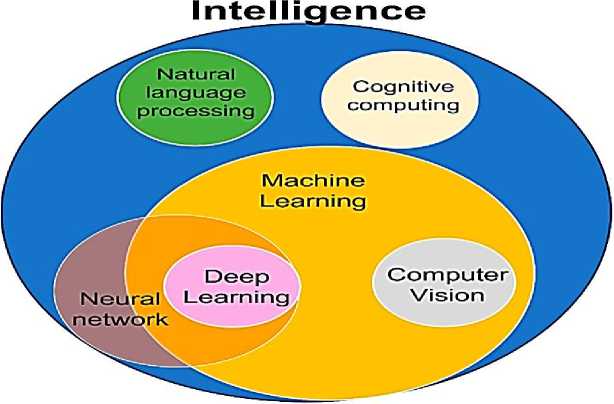
-
2- Applications of artificial intelligence and remote sensing in archaeological research.
In their 2016 research paper, Shafiee and others presented the application of pattern recognition in detecting buried archaeological sites based on environmental variable analysis in Siahkal Khorramabad, western Iran. This study provided clear evidence that pattern recognition has real potential as an effective application of artificial intelligence for identifying archaeological burial sites. Furthermore, it is believed that the costly and time-consuming efforts to survey and excavate landscapes that offer a limited range of archaeological content can be avoided by archaeologists3.
In the field of archaeology, as reported by Jameel and colleagues, there has been a growing trend in recent years towards using artificial intelligence algorithms such as Machine Learning (ML) and Deep Learning (DL) for classifying and identifying archaeological artifacts. However, the same paper notes that research in detecting archaeological structures, especially those employing DL algorithms or using aerial imaging, is still inadequate.4
-
2 Albert Attila Keresztesi, Moreno-Doru Reş :Elements of Artificial Intelligence in Integrated Information Systems, June 2022 ,Acta Marisiensis Seria Oeconomica , 16(1):81-90.
-
3 Siyamack Sharafi And others: Application of pattern recognition in detection of buried archaeological sites based on analysing environmental variables, Khorramabad Plain, West Iran, August 201 6,Journal of Archaeological Science Reports 8:206-215
-
4 Siyamack Sharafi And others : Application of pattern recognition in detection of buried archaeological sites based on analysing environmental variables, Khorramabad Plain, West Iran,August 2016 ,Journal of Archaeological Science Reports, 8 :206-215.
Sci. Educ. Innov. Context Mod. Probl. P-ISSN: 2790-0169 E-ISSN: 2790-0177 Issue 3, Vol. 8, 2025, IMCRA
In 2019, Orengo and Garcia-Molsosa published an article related to automated detection of pottery sherds based on machine learning using high-resolution drone imagery. The results of this research demonstrate that the potential of this technology, if applied under suitable field conditions, can produce accurate distribution maps of individual pottery fragments, providing new possibilities for archaeological surveys. The workflow combines drone-based aerial imaging with machine learning to automatically record surface distributions of archaeological materials. As a result, it has delivered faster results and higher analytical capabilities under favorable conditions compared to traditional pedestrian surveys5.
-
3- Remote Sensing using satellite imagery for grave detection.
Dr. Gino Caspari is an archaeologist and researcher at the Swiss National Science Foundation, focusing on the ancient Scythian civilization6, a nomadic people from 3000 years ago with a rich culture and a dominant empire centered in the modern-day Crimean Peninsula. Scythian royal tombs were known to contain great wealth, making them common targets for tomb raiders. Caspari estimates that over 90% of these burial sites have now been destroyed7.
Dr. Caspari turned to Pablo Crespo, a graduate student studying economics at the City University of New York, who used artificial intelligence (AI) to estimate fluctuations in commodity
Sci. Educ. Innov. Context Mod. Probl. P-ISSN: 2790-0169 E-ISSN: 2790-0177 Issue 3, Vol. 8, 2025, IMCRA prices. Together, they worked on building a convolutional neural network to sort through and search satellite images, positioning them at the forefront of archaeological analysis.
The Convolutional Neural Network (CNN) analyzes information that can be processed as a grid, making it suitable for analyzing photographic and image data. The CNN developed by Crespo and Caspari assigns a classification to each pixel in the network based on its intensity in red, green, and blue channels. It analyzes small sets of pixel units and then larger ones, searching for matches or near-matches from the data it has been trained to identify.
The researchers worked for several months and ran 1,212 satellite images through a CNN network, searching for circular stone graves while avoiding other similar structures such as building debris and irrigation pools. Through testing on an area of approximately 2,000 square miles, the system correctly identified known graves 98% of the time.9
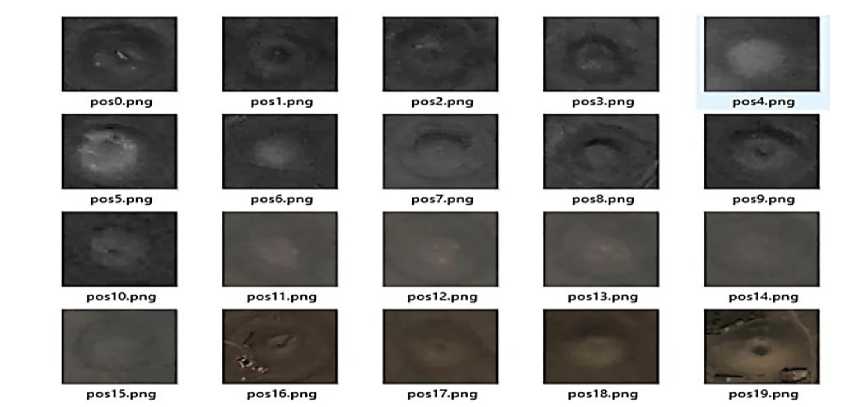
Training Data of Tomb Images for CNN 4- Classifying ancient pottery pieces
Two archaeologists at the University of Pisa in Italy, Gabriele Gattiglia and Francesca Anichini, are excavating sites dating back to the Roman Empire era and analyzing thousands of broken pottery pieces. The Romans made almost all containers, such as cooking vessels and
9Gino Caspari , Pablo Crespo: Convolutional neural networks for archaeological site detection -Finding "princely" tombs, August 2019 , Journal of Archaeological Science, 110(1).

Sci. Educ. Innov. Context Mod. Probl. P-ISSN: 2790-0169 E-ISSN: 2790-0177 Issue 3, Vol. 8, 2025, IMCRA amphorae used for shipping goods around the Mediterranean, from clay, so analyzing pottery is crucial for understanding Roman life and culture.
Dr. Gattiglia and Dr. Anichini estimate that only 20% of their time is spent excavating at the sites, while the rest is dedicated to pottery analysis and comparing the pottery pieces with images in catalogs. "We started dreaming of some magical tools to identify pottery while excavating," said Dr. Gattiglia. The dream culminated in the ArchAIDE project, a digital tool developed by computer scientists at Tel Aviv University in Israel and funded by the European Union's Horizon 2020 Research and Innovation Program, which allows archaeologists to photograph a pottery fragment in the field and identify it using a neural network10.
-
5- A robot underwater to find shipwrecks and digitally reconstruct them.
In the field of maritime archaeology, traveling to sites can often be costly and challenging, and divers cannot spend extended periods underwater due to the risk of severe pressure-related injuries. Chris Clark, an engineer at Harvey Mudd College, addresses these challenges by utilizing an underwater robot to conduct sonar surveys of the seafloor, while a neural network searches images for shipwrecks and other important underwater sites.
-
- A team deploys an "Autonomous Underwater Vehicle" off the coast of Malta.
Over the past few years, Clark has collaborated with Timmy Gambin, an archaeologist at the University of Malta, to survey the Mediterranean seabed surrounding the island. In 2017, a bomber from World War II was identified off the coast of Malta, and using sonar survey operations from the underwater robot, Clark and Gambin digitally reconstructed the site in three dimensions11.
Sci. Educ. Innov. Context Mod. Probl. P-ISSN: 2790-0169 E-ISSN: 2790-0177 Issue 3, Vol. 8, 2025, IMCRA
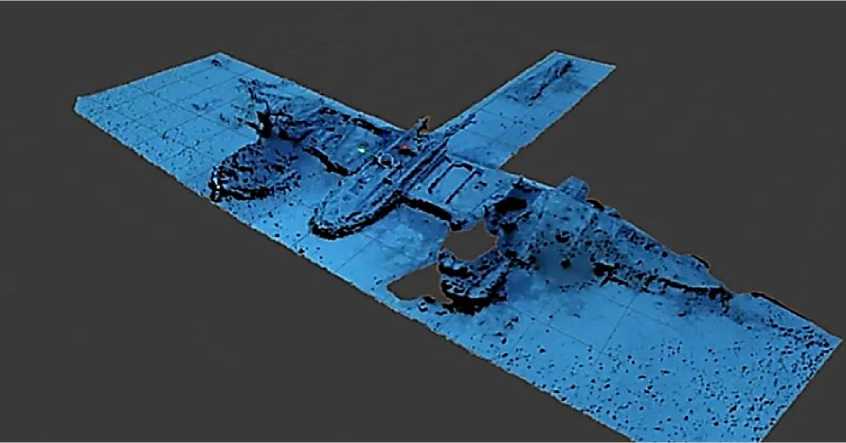
3D Digital Reconstruction of World War II Plane Wreck
-
6- Artificial intelligence is being used to translate ancient languages
Twenty-five centuries ago, the administrative records of the Achaemenid Empire of Persia were inscribed on clay tablets, tens of thousands of which were unearthed in modern-day Iran in 1933 by archaeologists from the University of Chicago's Oriental Institute. For years, scholars meticulously examined and translated these ancient documents manually, a process known for its difficulty, sluggishness, and susceptibility to errors.
Since the 1990s, researchers have turned to computers for assistance, albeit with limited success, owing to the tablets' three-dimensional nature and the intricate cuneiform script. However, a recent technological advancement at the University of Chicago promises to revolutionize the automated transcription of these tablets. This breakthrough holds the potential to unlock a wealth of information about Achaemenid history, society, and language contained within the tablets, thereby allowing archaeologists to focus on higher-level analyses.12
Researchers at the Oriental Institute at the University of Chicago and the Computer Science Department collaborated to bring the artificial intelligence system DeepScribe to decipher ancient tablet inscriptions. Archaeologists began integrating computer programs into the study of ancient
Sci. Educ. Innov. Context Mod. Probl. P-ISSN: 2790-0169 E-ISSN: 2790-0177 Issue 3, Vol. 8, 2025, IMCRA documents in the 1990s, but the complex cuneiform characters and three-dimensional shape of the tablets limited the effectiveness of the technologies. The computer vision model at the University of Chicago was trained on over 6,000 annotated images from the Persepolis Fortification Archive and a "dictionary" containing over 100,000 individually identified characters. Now, it can interpret inscriptions on ancient tablets with an accuracy approaching 80%.
The collaboration commenced when Paulus, Sandra Schloen, and Miller Prosser from the OI connected with Assistant Professor Sanjay Krishnan from the Department of Computer Science at a Neubauer Collegium event focused on digital humanities. Schloen and Prosser manage OCHRE, a database platform supported by the OI for collecting and structuring data from archaeological digs and various research endeavors. Krishnan specializes in applying deep learning and AI methodologies to analyze data, encompassing video and other intricate data formats. The common ground between their fields was immediately evident to both parties.
"From the perspective of computer vision, this is a fascinating challenge, mirroring the hurdles we encounter. The advancements in computer vision over the past five years have been substantial; a decade ago, this task would have been more speculative—we wouldn't have progressed this far," Krishnan commented. "It poses an intriguing machine learning problem because the accuracy is quantifiable here; we possess a meticulously labeled training set and a strong grasp of the script, which aids our understanding. It's not an entirely enigmatic issue."
The creation of this training set owes much to the extensive research spanning over 80 years by OI and UChicago scholars, coupled with recent efforts to digitize high-resolution images of the tablet collection—currently exceeding 60 terabytes and continuously expanding—prior to their repatriation to Iran. Leveraging this database, researchers compiled a lexicon of the Elamite language inscribed on the tablets, while students undergoing cuneiform decipherment training assembled a database comprising over 100,000 "hotspots," representing individual signs.
Leveraging resources from the UChicago Research Computing Center, Krishnan utilized this annotated dataset to train a machine learning model, akin to those employed in other computer vision initiatives. When tested on tablets not included in the training data, the model accurately deciphered cuneiform signs with around 80% precision. Subsequent research endeavors aim to enhance this accuracy rate while exploring the factors contributing to the remaining 20%.13
-
13 Rob Mitchum.Mar 11, 2020.How AI could help translate the written language of ancient civilizations.Archaeology , Institute for the Study of Ancient Cultures (ISAC) , Computer science , Artificial intelligence.
Sci. Educ. Innov. Context Mod. Probl. P-ISSN: 2790-0169 E-ISSN: 2790-0177 Issue 3, Vol. 8, 2025, IMCRA
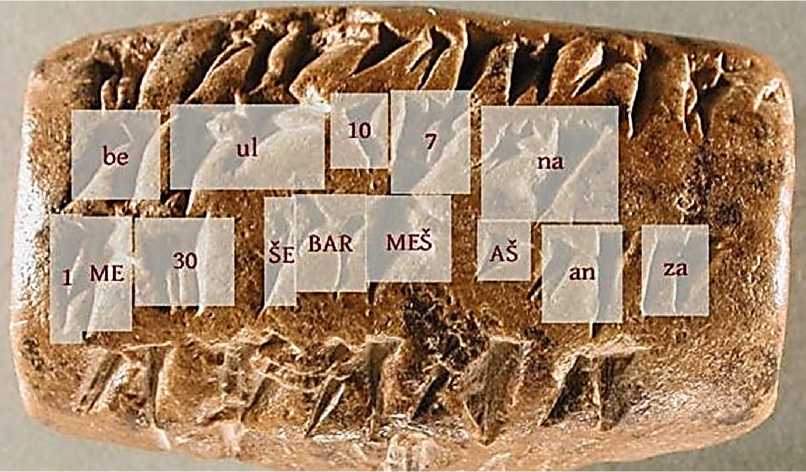
Pictured are hotspots outlining cuneiform signs on an Elamite tablet from the Persepolis
Fortification Archive.
Likewise, DeepMind, a subsidiary of Google, has developed the neural network PYTHIA to "fill in" missing inscriptions in ancient Greek on damaged surfaces of stone and ceramic artifacts. Researchers stated that PYTHIA, named after the Oracle at Delphi, "takes a sequence of damaged text as input and is trained to predict character sequences that include hypothetical restorations of ancient Greek inscriptions."
-
7- Three-dimensional digital modeling helps preserve history.
In 2010, French architect Yves Ubelmann captured an image of a small village in Afghanistan. Two years later, upon his return, the site was destroyed. An elderly man, recalling the image, told Ubelmann, "The picture is the only link I have to my personal history," encouraging him to share the image with others. This small interaction spurred the creation of Iconem, a Paris-based company that works on creating high-resolution 3D digital models of historical landmarks "threatened by war, conflict, time, and nature."
Sci. Educ. Innov. Context Mod. Probl. P-ISSN: 2790-0169 E-ISSN: 2790-0177 Issue 3, Vol. 8, 2025, IMCRA
Preserving history is crucial in countries like Syria, where all six UNESCO World Heritage sites, including temples, mosques, citadels, bazaars, and tombs dating back centuries, have been damaged due to years of war and violence.14
Preserving history has become an urgent priority in Syria, where seven years of conflict have ravaged all six of the country's UNESCO World Heritage sites. These sites, which include ancient temples, mosques, citadels, tombs, and bazaars that have stood for centuries, have been either destroyed or severely damaged. Ubelmann, drawing inspiration from his grandfather who restored churches in France post-World War II, views Iconem's efforts in Syria as a continuation of this legacy: safeguarding the nation's cultural heritage and reconstructing landmarks devastated by bombs, artillery, and looters.
Iconem's extensive documentation in Syria encompasses Palmyra, a once-thriving desert city that embodied a fusion of Greek, Roman, and Islamic cultures. Today, Palmyra stands as a somber landscape of collapsed temples and pillars, some dating back 2,000 years, many systematically obliterated.
Jonathan Chemla, Iconem's chief technology officer, who processed survey data in 2016 and 2017, reflects on the profound impact of witnessing the state of these monuments. "The sight of these structures is truly jarring," he remarks. "It's as if there is a deliberate intent to erase an entire culture. Yet, amidst the destruction, the essence of Palmyra still lingers."
The team employed drones to capture 50,000 images of Palmyra, navigating carefully to avoid hazardous landmines. In western Syria, they documented 150,000 images of Crac des Chevaliers, renowned as one of the world's most iconic Crusader castles, now scarred by conflict. This project was conducted in collaboration with UNESCO. Furthermore, they conducted surveys of Aleppo's Old City, once a vibrant historic district featuring a 13th-century citadel, ancient mosque, and bustling souk, now reduced to ruins by the ravages of war.
Iconem's aircraft capture thousands of images across 20 countries, and machine learning algorithms, powered by Microsoft AI, stitch these images together into high-resolution 3D models to assess the level of damage, reconstruct parts of the site, and immortalize its history.An aerial view image of the location where the Triumphal Arch stood in Palmyra, Syria, before its destruction in
-
14 Sabbagh, H. 2011. Archeological Sites in Ancient City of Apamea Vandalized and Pillaged. Sana - Syrian News Agency, 20 September (available at http:/ / www.sana.sy/eng/21/2011/09/20/370499.htm
Sci. Educ. Innov. Context Mod. Probl. P-ISSN: 2790-0169 E-ISSN: 2790-0177 Issue 3, Vol. 8, 2025, IMCRA
A 3D Iconem model showing the reconstruction of the arches.
Describing Iconem's work, Ubelmann says, "It's a way to keep history alive." "If you don't know where you come from, you don't know where you're going."15
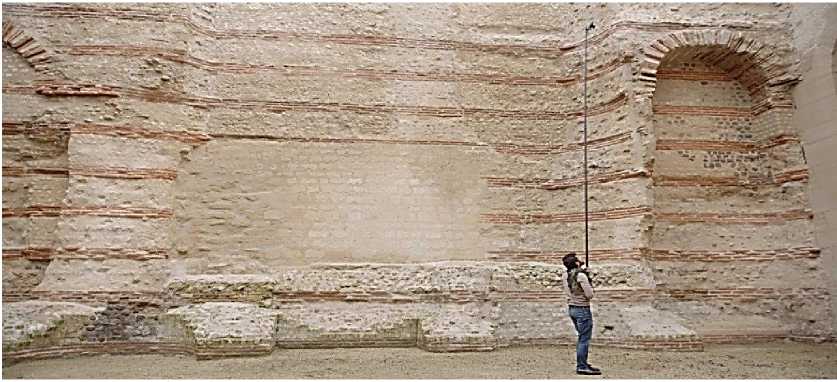
Yves Ubelmann, founder and CEO of Iconem. (Photo by Iconem)
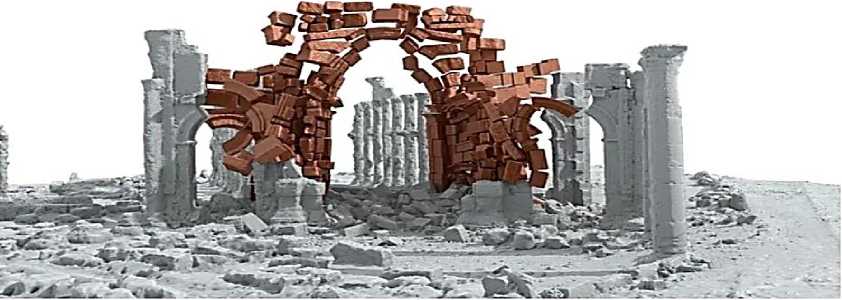
Iconem’s 3D model of how the arches could be rebuilt and restored
- conclusion:
-
15 Vanessa Ho.Apr 23, 2018.‘Heritage activists’ preserve global landmarks ruined in war, threatened by time.
Sci. Educ. Innov. Context Mod. Probl. P-ISSN: 2790-0169 E-ISSN: 2790-0177 Issue 3, Vol. 8, 2025, IMCRA
In the past, the tasks of archaeologists were extremely challenging. Remember, they did not have technological assistance for a long time when engaged in their historical information discovery tasks. Certainly, this has changed significantly over the years. In fact, the emergence of technology has greatly facilitated archaeologists in discovering various things. Recently, Artificial Intelligence (AI) and Machine Learning (ML) have also been extensively used in the field of archaeology. This is expected to make the conclusions of experts more comprehensive.

